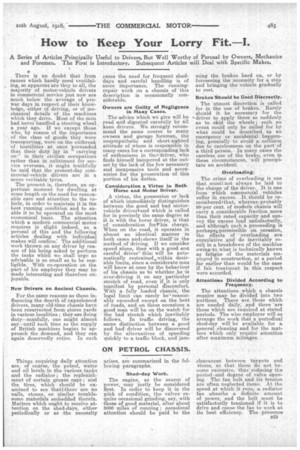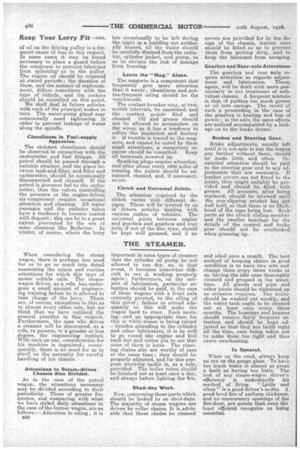How to Keep Your Lorry Fit.—I.
Page 5

Page 6

If you've noticed an error in this article please click here to report it so we can fix it.
A Series of Articles Principally Useful to Drivers, But Well Worthy of Perusal by Owners, Mechanics and Foremen. The First is Introductory. Subsequent Articles will Deal with Specific Makes.
There is no doubt that from causes which hardly need ventilating, so apparent are they to all, the majority of motor-vehicle drivers in commercial service just now are much below, the average of prewar days in respect of their knowledge, either of driving, or of mechanical details of the machines which they drive. Most of the men had never handled a steering wheel a year ago. If we except those who, by reason of the importance of the class of goods they were transporting, were on the outbreak of hostilities at once persuaded that their duty lay in " carrying on" in their civilian occupations rather than in enlistment for service overseas, it might truthfully be said that the present-day commercial-vehicle drivers are in a. sense veritable tyros.
The present is, therefore, an opportune moment for dwelling at some length on the need for reasonable care and attention to the ye • hide, in order to maintain it in the best running condition and to enable it to be operated on the most economical basis. The attention which a modern commercial motor requires is slight indeed, as a perusal of this and the following articles dealing with individual makes will confirm.' The additional work thrown on any driver by reason of his being asked to perform the tasks which we shall urge as advisable is so small as to be negligible. With co-operation on the .part of his employer they may be Made interesting and therefore enjoyable.
New Drivers on Ancient Chassis.
For the same reasons as these influencing the dearth of experienced drivers, many old-time chassis have been resurrected from stores yards in various localities ; they are doing duty—manfully, one might almost say—until such time as the supply of British machines begins to approach the demand, and they can again deservedly retire. In snch Things requiring daily attention are, of course, the petrol, water and oil levers .in the various tanks and the radiator ; the replenishment of certain grease caps ; and the tires, which should be examined to see thati there are no nails, stones, or similar troublesome materials embedded therein. Matters which ought to receive attention on the shed-days, either periodically or as the necessity cases the need for frequent sheddays and careful handling is of more importance. The runningrepair work on a. chassis of this description is occasionally considerable.
Owners are Guilty of Negligence in Many Cases.
The advice which we give will be read and digested carefully by all. keen drivers. We strongly recommend the same course to many owners and garage foremen, the unsympathetic and short-sighted attitude of whom is responsible in many cases for a corresponding lack of enthusiasm in the driver, who finds himself hampered at the outset by the lack of the few necessary and inexpensive tools and accessories for the prosecution of this portion of his d.uties.
Conaideration a Virtue in Both Horse and Motor Driver.
A virtue the possession or lack of which immediately distinguishes between the good and bad motorvehicle drivertand which is called for in precisely the same degree as It is with the horse driver, is that of consideration fornis charge. When on the road, it operates in almost an identical manner in both cases and& shows itself in the method of driving, if we consider speed alone, then with a good and careful driver' this; will be automatically restrained,ewithin desirable limits, since a considerate man will know at once by the behaviour of his chassis as to whether he over-driving it on any particular stretch of road, even if_it is only manifest by personal discomfort. With a fully loaded chassis, the legal limit can rarely be' reasonably exceeded except •on the best of roads, and on these occasions a good man will be on the watch' for the bad stretch which inevitably follows. In traffic driving, the same distinction between a good and had driver will be discovered by the alternatives of speeding quickly to a traffic block, and jam
ON PETROL CHASSIS.
arises, are summarized in the following paragraphs.
Shed-day Work.
The engine, as the source of power, may justly be considered first. In order to keep it in the pink of condition, the valves require occasional grinding, say, with those of good material, after about 5000 miles of running ; occasiOnal attention should be paid to the ming the brakes hard on, or by foreseeing the necessity for a stop and bringing the vehicle gradually to rest.
Brakes Should be Used Discreetly.
The utmost discretion is called for in the use of brakes. Rarely should it be necessary for the driver to apply these so suddenly as to skid the wheels ; such an event could only be called for by what could be described as an emergency or accidental happening, generally to avoid a collision due to carelessness on the part' of a third person. In many cases the careless use of the brake, even in these circumstances, will precipitate an accident.
Overloading.
The crime of overloading is one that mustj.not always be laid to the charge of the-driver. It is one from which commercial vehicles suffer in excess. It should be remembered/that, whereas& probably 90,per cent. of modern chassis will carry a considerable fraction more than their rated capacity, and convey the excess Todd satisfactorily, and although such a proceedine is perhaps4 permissible on. occasion, the effects of overloading are cumulative and do inevitably result in a breakdown of the machine owingto, what is technically known as fatigue of the materials employed in construction, at a period far eailier than would be the case if fait treatment in this respect were accorded.
Attentions Divided According to Frequency.
The attentionswhich a chassis require may be divided into two portions. There are those which are needed daily; ,and there are those which are requirecl.at stated periods. The wise employer will so arrange the work that a periodical shed-day will be available for a general cleaning and for the mat, ter s which only require attention after maximum mileages.
clearances between tappets and stems, so that these do not become exCessive, thus reducing the period and degree of valve opening. The fan belt and its tension are often neglected items. At the speed at which it runs, a radiator fan absorbs a definite amount of power, and the belt must be satisfactorily tensioned if it is to drive and cause the fan to work at its best efficiency. The presence
of oil on the driving pulley is a frequent cause of loss in this respect. In some cases it may be found necessary to place a guard before the crankcase to prevent lubricant from splashing, on to the pulley. The engine oil should be renewed at stated periods ; the duration of these, and the manner of replenishment, differs sometimes with the type of vehicle, and the makers should be consulted on this point.
We shall deal in future articles with each of the principal makes in turn. The water-pump gland may occasionally. need tightening in order to prevent leakage of water along the spindle.
Cleanliness in Fuel-supply Apparatus.
The strictest cleanliness should be observed in connection with the carburetter and fuel fittings. All petrol should be passed through a suitable strainer, and the pipes between tank-and filter, and filter and carburetter, should be occasionally disconnected and cleaned. If the petrol is pressure fed to the carburetter, then the valves controlling the pressure or the engine-driven air-compressor require occasional attention and cleaning. All water passages and the radiator tubes have a tendency to become coated with deposit ; this can be to a great extent prevented by the use of some chemical like l3oilerine. In winter, of course, where the lorry has occasionally to be left during the night in a building not artificially heated, all the water should be carefully drained from the radiator, cylinder jacket, and pump, so as to obviate the risk of damage from freezing.
" Leave the "Mag." Alone.
The magnet() is a component that frequently gets more attention than it wants; cleanliness and mottoo-frequent oiling should be the watchwords.
The contact-breaker may, at twomonth intervals, be examined, and the contact points filed and. cleaned. Oil and grease should not be allowed to accumulate on the wires, as it has a tendency to soften the insulation and destroy it. If trouble is traced to the magneto, and cannot be cured by these small attentions, a competent repairer should be consulted. Keep all terminals screwed up. Sparking plugs require attention, and after about every Moo miles of running the points should be examined, cleaned, and, if necessary, re-set.
Clutch and Universal Joints.
The attention required by the clutch varies with different designs. These will be treated by us in future articles dealing with various makes of vehicles. The universal joints between engine and gearbox and gearbox and rear axle, if not of the disc type, should be kept well greased, and if no
covers are provided for in the design of the chassis, leather ones should be fitted so as to prevent them from getting dirty, and to keep the lubricant from escaping.
Gearbox and Rear-axle Attentions.
The gearbox and rear axle require attention as regards adjustment and lubrication. These, again, will be dealt with more particularly in our treatment of individual chassis. A frequent mistake is that of putting too much grease or oil into casings. The result of such a proceeding in the case of the gearbox is heating and loss of power ;in the axle, the same effects are noticed accompanied by a leakage on to the brake drums.
Brakes and Steering Gear.
Brake adjustments, usually left until it is not safe to run the wagon any further without them, should
belittle and often. Occasonal attention should be paid to the steering gear and to any adjustments that are necessary. If leather covers are not fitted to the joints, they might suitably be provided and should be filled with grease. All greasers, after being replaced, should be screwed until the non-slipping ratchet has got well hold, so that there is no likelihood of the caps being lost. Such parts as the clutch sliding-member and the smaller bearings for the details of the control and brake gear should not be overlooked when greasing up.






















